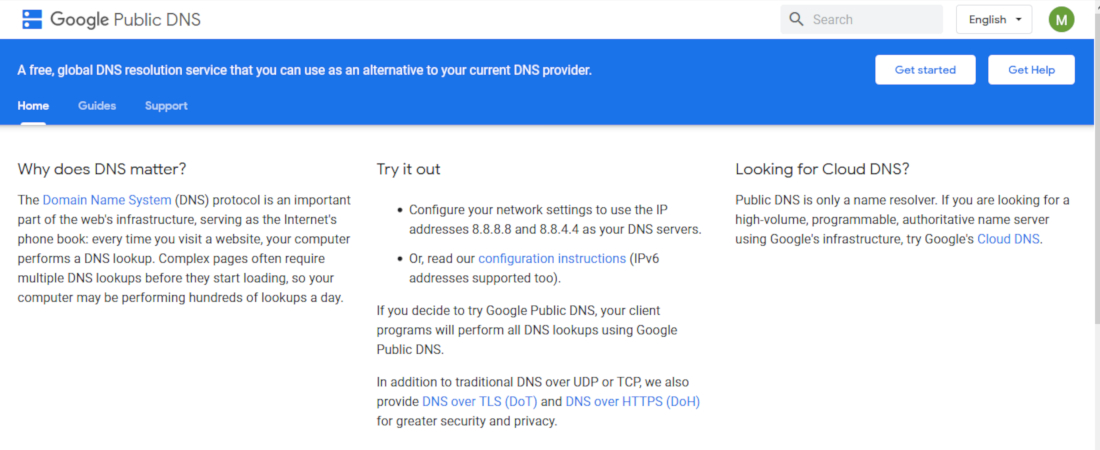TechRadar Verdict
If you want to make your website administrative tasks easier and more efficient, the Google Public DNS service will make a great addition to your arsenal of tools.
Pros
- +
Reliable (Large database)
- +
Free to use
- +
Very secure
Cons
- -
Little customer support
- -
Complex user interface
- -
Privacy concerns
Why you can trust TechRadar
Google, the company, may need no introduction. It’s famous for its search engine, which is the most visited website globally. At this point, Google has become a verb and “Google it” a popular phrase.
What many people don’t know is that Google offers a wide range of other software services, and the Public DNS service is one such example. DNS refers to “domain name service,” which is akin to the phonebook of the internet. A DNS is what translates human-readable domain names (e.g., Google.com) to machine-readable IP addresses (e.g., 216.239.32.0) that your browsers can point to and fetch the desired content.
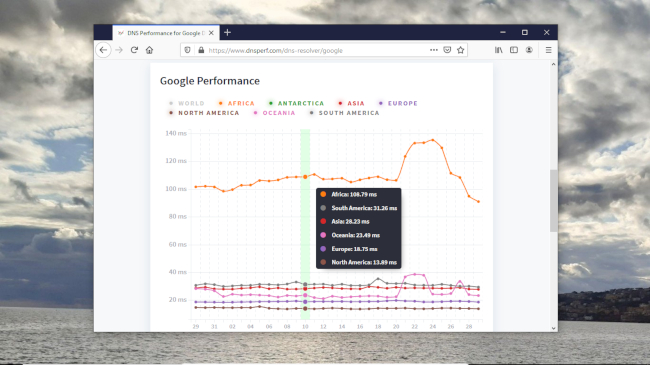
Google Public DNS: Plans and pricing
One of the best things about Google Public DNS is that it’s completely free to use. Google makes a lot of profit from advertisements on its search engine and popular video hosting service, YouTube, such that it can afford to offer other sophisticated products at no cost and come out ahead.
Many competing products charge money for similar features that Google’s Public DNS provides. Hence, it’s no surprise that people have largely flocked to a free alternative and made Google’s domain name system service the most popular one globally.
Google Public DNS: Features
DNS resolution is the primary function of Google Public DNS. You can use it to make sure that a web browser returns the right answer to every internet query. You, as in on your personal device, or as an internet service provider (ISP) that wants to ensure people on their network always get directed to the correct destination of their online queries.
As an ISP, you can configure your network infrastructure to return Google's Public DNS addresses. If you do that, your clients will use Google Public DNS directly, and any web query they send will go directly to it.
Likewise, you can configure your personal device to route all web queries through the Google Public DNS to ensure you get the correct response.
Sign up to the TechRadar Pro newsletter to get all the top news, opinion, features and guidance your business needs to succeed!
Here’s a simple explanation/analogy; Google has a vast database of domain names and their corresponding IP addresses. These addresses constantly change, but Google keeps up with the frequent changes and always updates the entries in its database.
For example, you want to head to www.Yahoo.com. If you have Google’s Public DNS enabled, once you type Yahoo.com into your web browser and click “go”, the query immediately passes through Google’s database where it seeks the corresponding IP address to Yahoo.com. Once it gets that IP address, it immediately directs you to the intended website.
What we explained above may seem trivial. But, consider that default DNS providers for ISPs are prone to making mistakes. You may get directed to a wrong or outdated IP address, which consequentially shows that the website is unable to resolve. In fact, you have likely experienced this problem before; a website that you frequently visit is suddenly unable to load on a specific device. The fault doesn’t come from the website’s host but from your ISP’s domain name resolution provider, and the appeal of using Google Public DNS is to minimize such errors.
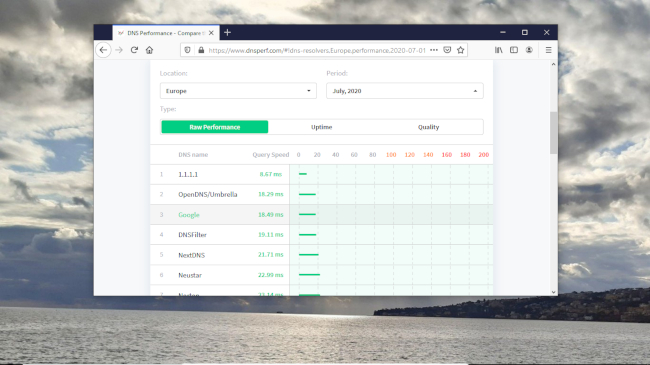
Google has more capacity than most DNS providers to support a high volume of queries. It uses large caches and load balancing to ensure it can respond to the majority of queries as fast as possible. Another advantage is that Google's DNS never redirects you to adverts if the URL you typed doesn't exist, unlike some competitors. If the URL doesn't exist, it will simply tell you rather than redirect you to a page filled with adverts or a close match.
Google’s DNS is also very secure, thanks to the company’s extensive web security expertise. Malicious web actors often poison a DNS provider's database to route users to IP addresses of malicious sites, but Google takes a lot of steps to prevent such attacks, e.g., using the DNSSEC cryptographic standards.
The company’s Public DNS has also been historically resistant to distributed denial-of-service (DDoS) attacks, where hackers seek to redirect swathes of users to a single IP address to stretch its hosting resources thin and make it unable to function. Hence, by using this service, there’s little possibility of falling victim to such attack vectors.
Configuring your network to use Google’s Public DNS isn’t too difficult. For an ISP, it’s as easy as changing your DNS settings to return Google Public DNS addresses (8.8.8.8, 8.8.4.4, and IPv6). It’s more complex for people configuring their personal devices but doable. Besides, Google provides detailed implementation guides on its website.
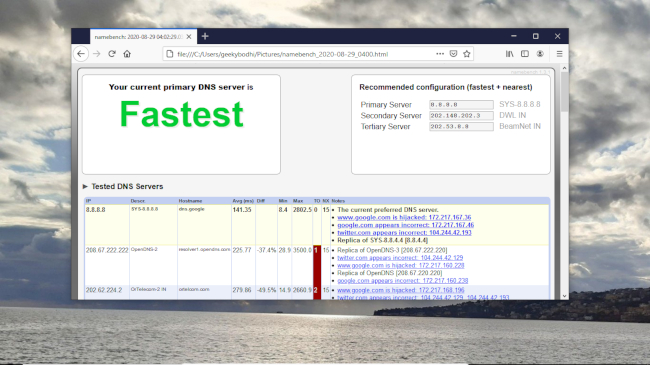
Google Public DNS: Interface and in use
As we’ve said, setting up your network to use Google Public DNS isn’t too hard, especially as an ISP. But, it’s a bit more complex to configure on your personal device, mainly for non-technical users. On the bright side, Google provides detailed documentation on its official developer website to walk users through the required steps.
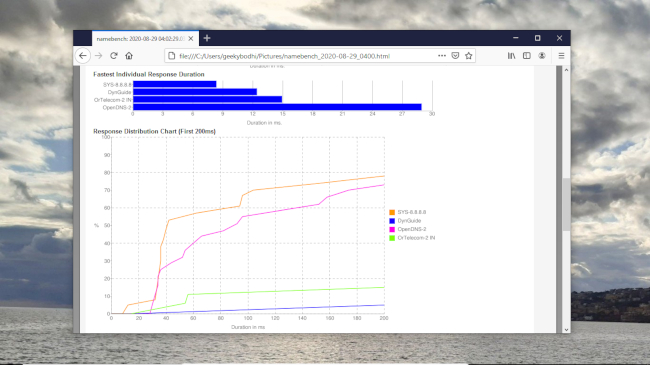
Google Public DNS: Support
As it’s a free DNS resolution platform serving tens of millions of people globally, expect little direct customer support from Google. The best you can get is the detailed user guides/documentation on the official developer page. There’s no live chat, telephone, or email support for free Public DNS users. However, people using the more sophisticated Google Cloud DNS have access to direct customer support.
Google Public DNS: The competition
Well-known alternatives to Google Public DNS include Cloudflare DNS, OpenDNS, and NextDNS. However, we consider Google’s DNS better than most alternatives, thanks to its large capacity and unmatched security.
Google Public DNS: Final verdict
The best thing about Google Public DNS is that it’s free. Think of it as a public service effort financed by Google that anyone around the globe can benefit from. It offers unmatched domain name resolution at no cost, whereas many competitors demand significant fees for a similar product. However, a major user concern we observed is the privacy implications of Google handling and knowing all your web requests and possibly showing you ads based on them.
- We've featured the best web hosting services.
Stefan has always been a lover of tech. He graduated with an MSc in geological engineering but soon discovered he had a knack for writing instead. So he decided to combine his newfound and life-long passions to become a technology writer. As a freelance content writer, Stefan can break down complex technological topics, making them easily digestible for the lay audience.
